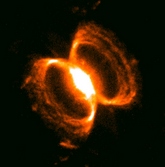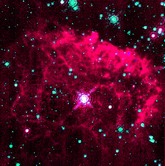Well, the results are in. And for the first time in a very long time, my choices were pretty much the ones that won – I mean, this just never happens! The Winners:
Best Novel – The Yiddish Policeman’s Union by Michael Chabon
Best Novella – All Seated on the Ground by Connie Willis
Best Novelette – The Merchant and the Alchemist’s Gate by Ted Chiang
Best Short Story – Tideline by Elizabeth Bear
Best Fan Writer – John Scalzi
Best Dramatic Presentation, Long Form – Stardust
Best Dramatic Presentation, Short Form – Doctor Who, “Blink”
Best Related Work – Brave New Words, The Oxford Dictionary of Science Fiction by Jeff Prucher
Best Editor, Long Form – David G. Hartwell
Best Editor, Short Form – Gordon van Gelder
Best Semi-Prozine – Locus
Best Fanzine – File 770
Of the Fiction awards, these are all my #1 choices except for the Best Novelette, where my #1 was The Cambist and Lord Iron by David Abraham. The Ted Chiang story was my #2 choice. Stardust was also my #1 for best movie. Best Fan Writer went to my #1, John Scalzi, though I imagine this will kick up a little fuss, as he’s so much of a professional besides writing about everything under the sun in very fannish fashion. And he indicates over on his site that his entry in the novel category The Last Colony lost by just nine votes. I haven’t seen the complete breakout of all the voting yet – but this kind of indicates that voting in this category was extremely close. About the only category that wasn’t even close to my choice was the Best Drama, Short Form, as I just don’t see what all the fuss is about in the Doctor Who series.
It’s very rare that my taste corresponds so closely to the general sf fan’s. Many years I’ve been left wondering just how in the heck anyone could have voted for the obviously much poorer piece of work that won instead of my own choice. And it’s also nice to see that sf fans, this year at least, didn’t turn up their noses at a work by someone who is not an integral part of the sf community, Michael Chabon, and gave their votes based on its perceived quality.
All in all, it was a very good year for sf (apologies to Frank Sinatra).
________________________
Update:
I’ve now gotten a look at the complete voting results (available here). The best novel voting went like this:
The Yiddish Policeman’s Union 195 195 231 292 332
The Last Colony 158 158 170 219 323
Rollback 152 152 163 186
Halting State 115 115 148
Brasyl 110 110
No Award 15
After eliminating the ‘No Award’ ballots, in the second round YPU pick up the most votes (i.e, of those who had Brasyl as their number 1 choice, the greatest plurality of them had YPU as their #2 choice). This is not surprising; YPU and Brasyl are probably the two most ‘literary’ works here, and those who like that ‘literary’ style in one are likely to like it in the other. What is a little surprising is that Halting State picked up the next greatest number of votes in this round, as it’s probably the ‘geekiest’ work here.
Round three is also something of a surprise, with YPU picking up 63 votes and being the clear #2 choice of those who picked Halting State as their #1. By this point The Last Colony is badly trailing YPU. But the last round is perhaps the biggest surprise, as The Last Colony picks up 104 votes vs YPUs 40 – clearly those who liked Rollback had a clear preference of Last Colony over YPU.
So the final total with YPU and Last Colony separated by only nine votes is perhaps a little misleading – YPU clearly led throughout the various voting rounds.
That’s this year. But I wouldn’t be at all surprised if Scalzi’s latest, Zoe’s Tale (no, I haven’t read it yet, this is based strictly on how well I know he writes and the few clues he’s let slip over on his site about it), makes next year’s ballot, and probably stands an excellent chance of winning, absent any other blockbuster being published in the next five months (which just might already be out – Doctorow’s Little Brother). His fan base just seems to keep growing.


